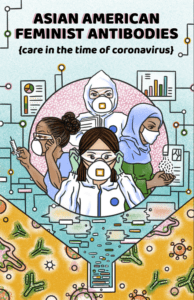
One guiding principle of the project is to center and enact an ethics of care, consideration, and community in our documentation efforts. That is, how do we take care to practice accountability, reciprocity, and community-building? 2020 has shown us, through the public health and economic effects of COVID-19 and the movements for racial justice, that our lives and livelihoods are interconnected and stitched together in myriad ways, seen and unseen. Through our collection of interviews and artifacts as well as in our interactions with individuals and communities in our affiliated programming or outreach, how do we actively co-produce a respectful and collaborative field of engagement? How do we honor the knowledge and experiences of everyone at the table while recognizing our own positionality, abilities, and capacities?A/P/A Voices has compiled a partially annotated list of resources (articles, interviews, guides, etc.) around accountability, care, and reciprocity that either have direct bearing on oral history, documentation, and archiving or have application beyond these arenas but, we believe, should help structure all thinking, including ours, around an ethics of storytelling, care, and community. We know this to be an incomplete list, and hope to grow this conversation.
Articles:
Every Person is a Philosopher / Every Day is Another Story by William Ayers and Richard Ayers
Toward a Survivor-Centered Approach to Human Rights Archives by Michelle Caswell
“AIDS Activism and the Oral History Archive” by Ann Cvetkovich
“We Already Are” by Yusef Omowale
“Reflections on Archives of Violence and Transformative Justice” by Gabriel Solis
“No One Owes Their Trauma to Archivists” by Eira Tansey
Guides:
NYC Trans Oral History Project Interview Handbook. Components of this handbook related to ethics are very useful
Ableism, Accessibility and Oral Histories by Geraldine Ah-Sue, Yosmay del Mazo, and Alice Wong. Presentation that discusses how to create accessible oral histories and ableist assumptions in media making. Note how access is defined here.
Trauma-Informed Life History Interviewing Practical Skills for Attorneys by Jane Field. Training materials via the Texas After Violence Project
The City Amplified: Oral Histories and Radical Archives edited by Allison Guess and Priti Kanakamedala. Specific practice-oriented pieces, including ones (co)written by Sadie Sullivan. Includes extensive and useful resource list of tools and websites for thoughtful and engaged archiving.
“How to Hide Faces and Scrub Metadata When You Photograph a Protest” by William Joel on The Verge. Includes protocols for including pictures/video of BLM protests
Architecting Sustainable Futures by Bergis Jules/Shift Design. This website includes a downloadable report in English and Spanish containing findings from a symposium funded by Mellon Foundation. Included on this site are a trove of thinking and visioning by some of the major players in community-based archiving in the US today.
The Power of the Story: The Voice of Witness Teacher’s Guide to Oral History by Voice of Witness
Interviews and Conversations:
How to Survive the End of the World. Podcast episode with Autumn Brown and adrienne maree brown on listening
“Necessary As Water” by Alexis Pauline Gumbs, presented by Columbia Oral History Master of Arts
Poetry is a Political Act June Jordan interviewed by Julie Quiroz Martinez. This short interview with June Jordan in Colorlines (from more than twenty years ago!) is still relevant. Aspects of poetry, as she defines it, are quite resonant in oral history practice e.g. as a way to create “dialogue between people who are not only unknown, but mute to each other” and as being powerful but never about dominance or being dominant.
Archiving Protests, Protecting Activists moderated by Bergis Jules, hosted by Documenting the Now. In this collective conversation held on June 19, 2020, critical archivists from different organizational spaces (including TAVP, DocNow, Project STAND, Blackivists, and WITNESS) discuss the importance of supporting activist labor through ethical modes of documentation. They talk about the necessity of documenting beyond the sake of documentation and creating processes of consent and refusal that meet the legal/ethical needs of activists.
Whose Story? by Lauren Wissott. This piece on the International Documentary Association’s site is not centered on oral history, but more broadly how documentarians (specifically documentary filmmakers) can avoid extractive practices. Speaking with five documentary filmmakers, this article offers words of caution that are also very applicable to oral historians, especially those working in institutional contexts and/or are academics.
Principles:
“Anti-Oppression Principles” developed by Center for Story-Based Strategy
Principles of Disability Justice developed by Sins Invalid
